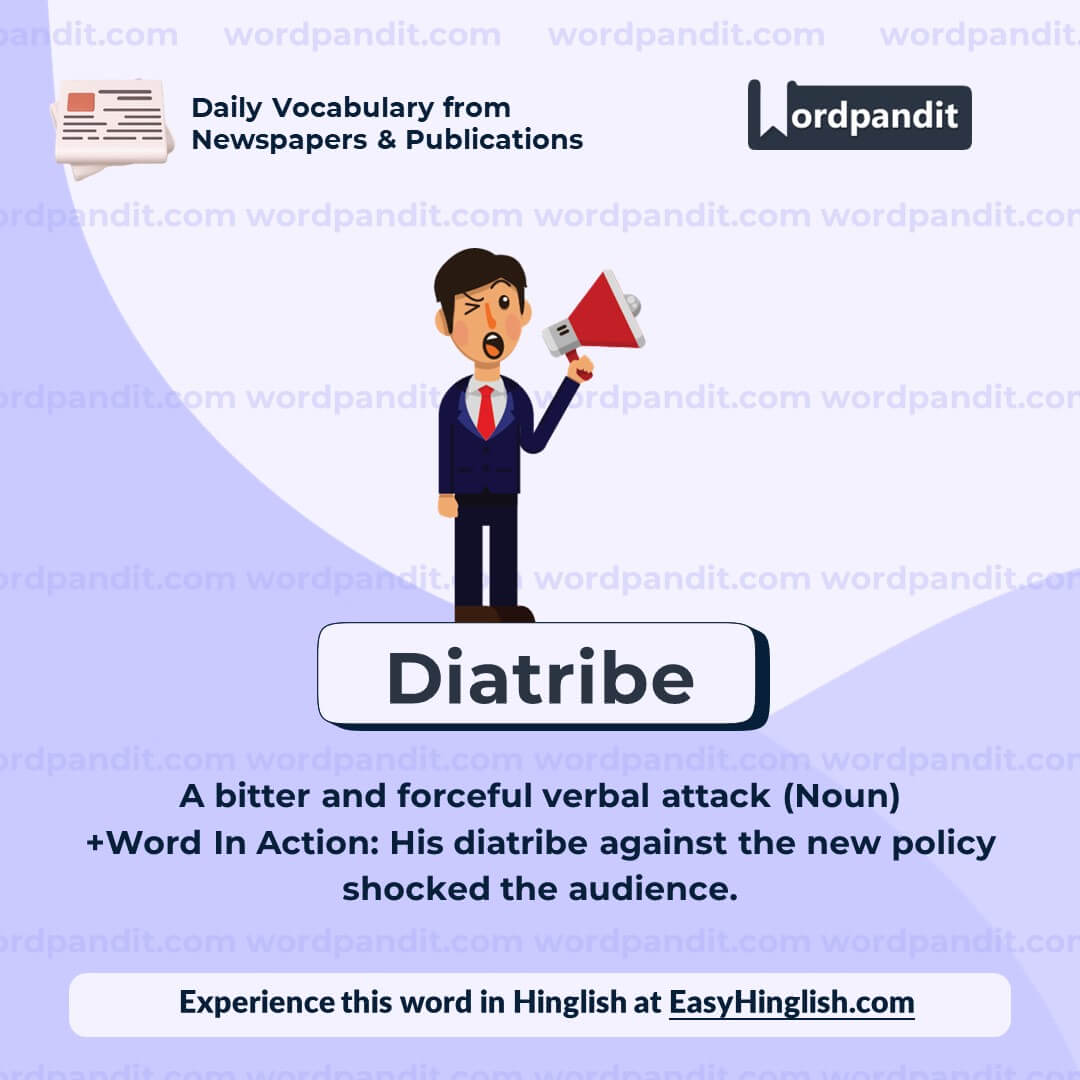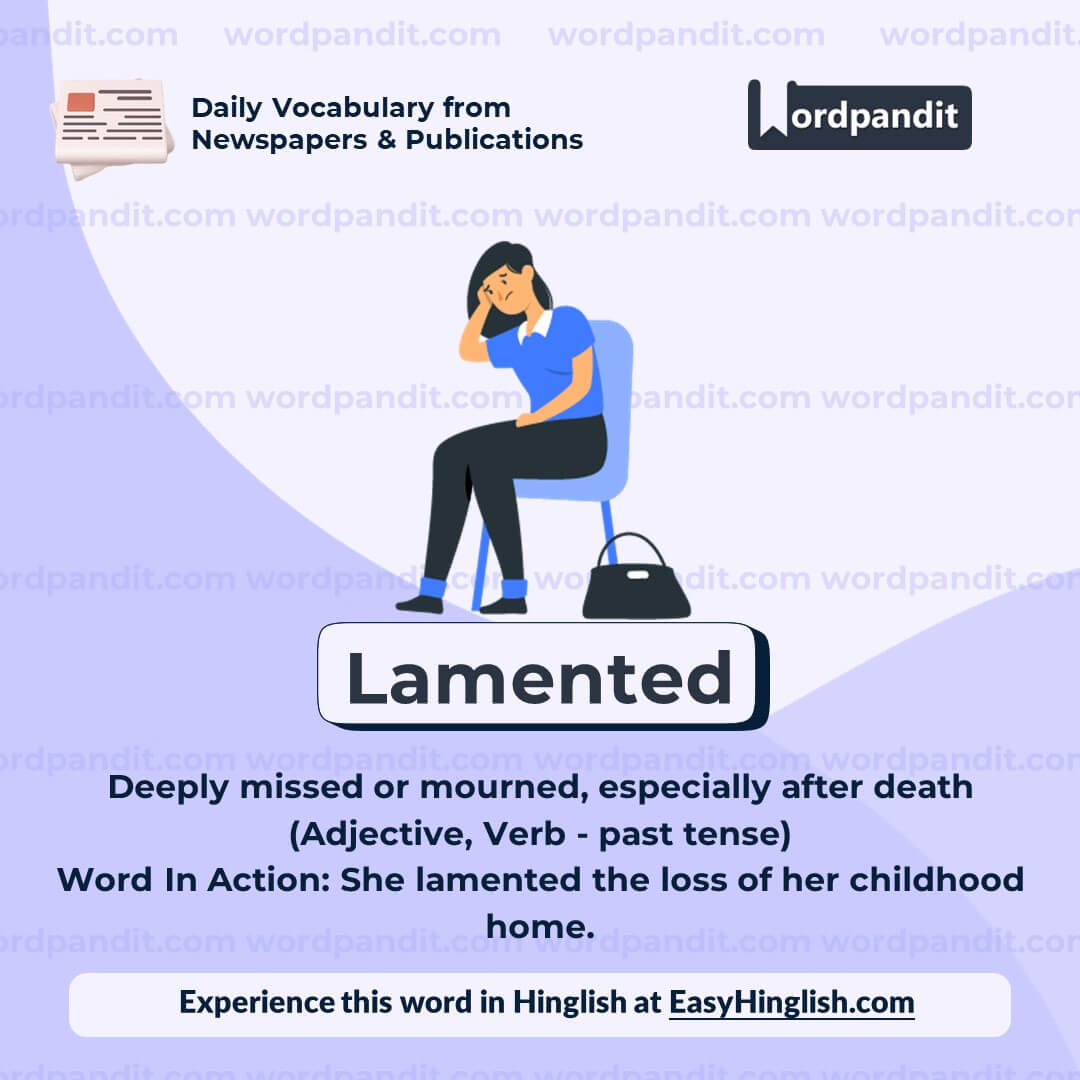Daily Vocabulary from International Newspapers and Publications
Expand Your Vocabulary with Wordpandit’s Global Vocabulary Hub
At Wordpandit, we are committed to helping you develop a truly global vocabulary by drawing from some of the most respected international publications. This section is designed to keep you ahead of the curve by introducing you to words that define global conversations and trends.
The Power of Global Sources
To help you think and communicate on a global scale, we curate vocabulary from renowned international sources, such as:
- The New York Times
- The Washington Post
- BBC
- The Guardian
- The Economist
- Scientific American
- Psychology Today
- And many more...
Stay Global, Stay Competitive
Our daily updates from international publications ensure you are consistently exposed to new words that reflect global news and developments, making sure your vocabulary is not only current but also globally relevant.
Enhance Your Global Perspective
Whether you’re preparing for international exams, aiming to excel in global business communication, or want to enhance your language skills for personal growth, Wordpandit offers the resources you need to thrive in a global context.
Effective Learning, Global Reach
Our learning methodology combines global examples, memory aids, and interactive activities, allowing you to internalize new words effectively and apply them in real-world scenarios.
Begin Your Global Vocabulary Journey Now!
Why Choose Wordpandit?
Practical Learning: Focus on words you'll actually encounter in real-world reading, enhancing your comprehension and communication skills.
Diverse Content: From current affairs to scientific breakthroughs, our varied sources expose you to vocabulary across multiple domains.
Effortless Integration: Make Wordpandit a part of your daily routine. Just a few minutes each day can significantly boost your lexicon over time.
Your Path to Vocabulary Mastery
- Visit our Daily Vocabulary section regularly
- Explore new words and their usage in context
- Practice incorporating these words into your own writing and speech
- Track your progress as your vocabulary expands
Start Your Journey Today
Embark on your vocabulary enhancement journey with Wordpandit. By consistently engaging with our daily posts, you'll build a robust vocabulary that serves you well in academic, professional, and personal contexts.
Remember, a word a day keeps linguistic limitations at bay. Make Wordpandit your daily companion in the quest for vocabulary excellence!
WORD-1: Rewarding
Context:
"And he told of brilliant scientific minds who might know a lot about the second law but were barely up to the task of reading Charles Dickens, let alone an 'esoteric, tangled and dubiously rewarding writer...like Rainer Maria Rilke.'" - Aeon
Explanatory Paragraph:
The word "rewarding" describes something that provides satisfaction, benefit, or a sense of achievement. It can refer to experiences, tasks, or endeavors that feel worthwhile because they offer emotional, intellectual, or material gains. A job can be rewarding if it brings fulfillment, just as reading a complex book can be rewarding if it deepens one’s understanding or perspective.
Meaning: Providing satisfaction or benefit (Adjective)
Pronunciation: ri-WAWR-ding
Difficulty Level: ⭐⭐ Beginner-Intermediate
Etymology: Derived from "reward," which originates from Old French "reguard" meaning "regard, recompense," combined with the suffix "-ing" to form an adjective.
Synonyms & Antonyms:
Synonyms: fulfilling, satisfying, gratifying, beneficial, worthwhile
Antonyms: disappointing, frustrating, unfulfilling, unsatisfying
Usage Examples:
- Teaching young children can be challenging, but it is incredibly rewarding when you see their progress.
- Although the hike was tough, reaching the summit was a rewarding experience.
- She finds volunteering at the shelter deeply rewarding, as it allows her to give back to the community.
- Reading classic literature may be difficult at first, but it becomes rewarding once you grasp the deeper meanings.
Cultural Reference:
"True happiness comes from the joy of deeds well done, the zest of creating things new." - Antoine de Saint-Exupéry. This quote highlights how engaging in meaningful, rewarding activities brings deep fulfillment.
Think About It:
What is one activity in your life that you find truly rewarding? Why does it give you a sense of fulfillment?
Quick Activity:
Write a short paragraph about a rewarding experience you have had, explaining why it was meaningful to you.
Memory Tip:
Think of "rewarding" as something that gives you a "reward"—not necessarily a physical prize, but a feeling of satisfaction or achievement.
Real-World Application:
"Rewarding" is often used in professional and personal contexts. It can describe fulfilling careers, enriching hobbies, and meaningful relationships. Employers may use it to describe jobs that provide a sense of purpose, and individuals may use it to express satisfaction with their experiences.
WORD-2: Diatribe
Context:
"Sixty-plus years after Snow's diatribe, the rift has hardly narrowed." - Aeon
Explanatory Paragraph:
A "diatribe" is a forceful and bitter verbal attack against someone or something. It often takes the form of a long speech or written piece in which the speaker or writer strongly criticizes or condemns a person, idea, or institution. Diatribes are usually passionate, filled with anger or frustration, and aim to persuade or provoke a reaction from the audience.
Meaning: A bitter and forceful verbal attack (Noun)
Pronunciation: DYE-uh-tribe
Difficulty Level: ⭐⭐⭐ Intermediate-Advanced
Etymology: From Greek "diatribein," meaning "to wear away" or "spend time," later evolving in Latin and English to mean prolonged discourse, especially one full of criticism.
Synonyms & Antonyms:
Synonyms: rant, tirade, condemnation, harangue, polemic
Antonyms: praise, compliment, eulogy, commendation
Usage Examples:
- The politician's speech turned into a diatribe against his opponents, filled with accusations and anger.
- After a long day at work, she launched into a diatribe about the inefficiency of her company's management.
- The writer’s diatribe against modern technology sparked controversy among readers.
- Instead of a constructive discussion, his comment section became a platform for endless diatribes.
Cultural Reference:
Famous historical diatribes include Martin Luther’s criticism of the Catholic Church in the "95 Theses" and George Orwell’s scathing political commentaries. These strong opinions changed history, showing how diatribes can spark revolutions or intellectual movements.
Think About It:
When does a passionate argument become a diatribe? Do you think diatribes are effective in bringing about change?
Quick Activity:
Write a short diatribe (three to four sentences) on a topic that frustrates you. Try to make it intense and expressive!
Memory Tip:
Think of "diatribe" as a "tribe" of words attacking a person or idea aggressively!
Real-World Application:
"Diatribe" is commonly used in political discussions, social media debates, and literature. It is often associated with rants on controversial topics, making it relevant in today's world of online discourse and public opinion.
WORD-3: Lamented
Context:
“The Duchess is remembered as one of the great beauties of Ireland and is deeply lamented to this day.” - Aeon
Explanatory Paragraph:
The word "lamented" refers to someone or something that is deeply mourned or grieved, often after their passing. It is typically used in formal or poetic contexts to express sorrow or regret over a loss. In literature and historical narratives, a "lamented" figure is someone who was cherished and whose absence is felt profoundly.
Meaning: Deeply missed or mourned, especially after death (Adjective, Verb - past tense)
Pronunciation: luh-MEN-tid
Difficulty Level: ⭐⭐ Beginner-Intermediate
Etymology: From Latin "lamentari," meaning "to wail or weep," which later evolved in Old French and Middle English to mean "express sorrow."
Synonyms & Antonyms:
Synonyms: mourned, grieved, missed, bewailed, sorrowed
Antonyms: celebrated, praised, rejoiced
Usage Examples:
- The late professor was widely lamented by his students, who cherished his wisdom and kindness.
- Many authors have lamented the decline of traditional bookstores in the digital age.
- She lamented the loss of her childhood home, which held countless memories.
- The legendary musician was deeply lamented by fans around the world.
Cultural Reference:
Shakespeare frequently used the word "lamented" in his plays, often in the context of mourning lost love or fallen heroes. In "Hamlet," the death of the king is lamented throughout the play, driving the plot forward.
Think About It:
Why do certain people or events continue to be lamented long after they are gone? What qualities make someone unforgettable?
Quick Activity:
Write a short paragraph about a historical figure who is still lamented today and explain why their loss is deeply felt.
Memory Tip:
Think of "lamented" as connected to "lament," which means to cry or express sorrow over something lost.
Real-World Application:
"Lamented" is commonly used in formal writing, history books, and journalism to describe someone whose absence is deeply felt. It is also used metaphorically for things that are regretted, such as lost traditions or opportunities.
WORD-4: Eminent
Context:
"And he quoted eminent colleagues such as the Nobel laureate Steven Weinberg, Stephen Hawking and Neil deGrasse Tyson, who agreed that 'philosophy is dead' and that only the natural sciences could explain how the world works, not 'what you can deduce from your armchair'." - Aeon
Explanatory Paragraph:
The word "eminent" is used to describe someone who is highly respected, distinguished, or famous in a particular field. Eminent individuals have achieved great recognition due to their expertise, contributions, or influence. The term is often used in reference to scholars, scientists, artists, or public figures who have made significant impacts in their domains.
Meaning: Famous, respected, and distinguished in a particular field (Adjective)
Pronunciation: EM-uh-nuhnt
Difficulty Level: ⭐⭐ Intermediate
Etymology: Derived from Latin "eminens," meaning "standing out, projecting," from "eminere" (to stand out, be prominent).
Synonyms & Antonyms:
Synonyms: distinguished, renowned, esteemed, prominent, celebrated
Antonyms: unknown, insignificant, obscure, unimportant
Usage Examples:
- The conference was attended by eminent scientists from around the world.
- Dr. Sharma is an eminent surgeon known for his groundbreaking work in heart transplants.
- The book provides insights from eminent philosophers on the meaning of life.
- The university honored an eminent historian for her contributions to research.
Cultural Reference:
Many eminent figures throughout history have shaped the world, such as Albert Einstein in physics, Leonardo da Vinci in art and science, and Mahatma Gandhi in politics and peace movements.
Think About It:
What qualities do you think make a person eminent in their field? Is fame always a requirement for eminence?
Quick Activity:
Write a short paragraph about an eminent person in history or your own field of interest and explain why they are considered distinguished.
Memory Tip:
Think of "eminent" as someone who is "emerging" above others due to their great achievements.
Real-World Application:
"Eminent" is commonly used in academic, professional, and journalistic contexts to describe highly respected individuals. It is often used in news articles, award ceremonies, and biographies.
WORD-5: Laureate
Context:
"And he quoted eminent colleagues such as the Nobel laureate Steven Weinberg, Stephen Hawking and Neil deGrasse Tyson, who agreed that 'philosophy is dead' and that only the natural sciences could explain how the world works, not 'what you can deduce from your armchair'." - Aeon
Explanatory Paragraph:
The word "laureate" refers to someone who has been honored for their outstanding achievements, usually in academic, literary, or scientific fields. The term is commonly associated with the Nobel Prize, where "Nobel laureate" signifies someone who has won this prestigious award. Historically, the word comes from the tradition of crowning poets and scholars with laurel wreaths as a symbol of excellence.
Meaning: A person honored with an award for significant achievement (Noun)
Pronunciation: LAW-ree-it
Difficulty Level: ⭐⭐⭐ Intermediate-Advanced
Etymology: From Latin "laureatus," meaning "crowned with laurel," referencing the ancient practice of awarding laurel wreaths to victors and distinguished individuals.
Synonyms & Antonyms:
Synonyms: awardee, honoree, prizewinner, distinguished recipient
Antonyms: unknown, unrecognized, undistinguished
Usage Examples:
- Malala Yousafzai became the youngest Nobel laureate for her work in promoting girls' education.
- The Poet Laureate of the United Kingdom is an honorary position given to a distinguished poet.
- Albert Einstein was a Nobel laureate in physics for his contributions to theoretical physics.
- The university invited a laureate in literature to deliver the commencement speech.
Cultural Reference:
The Nobel Prizes, established by Alfred Nobel, recognize outstanding achievements in fields such as science, literature, and peace. Nobel laureates, like Marie Curie and Martin Luther King Jr., have left a lasting impact on the world.
Think About It:
If you could become a laureate in any field, which one would you choose and why?
Quick Activity:
Research a famous laureate from history and write a short paragraph about their contributions.
Memory Tip:
Think of "laureate" as someone "loaded with laurels"—a symbol of honor and excellence.
Real-World Application:
The term "laureate" is frequently used in academic and literary contexts, particularly in reference to Nobel Prize winners, Poet Laureates, and other distinguished awardees.



















